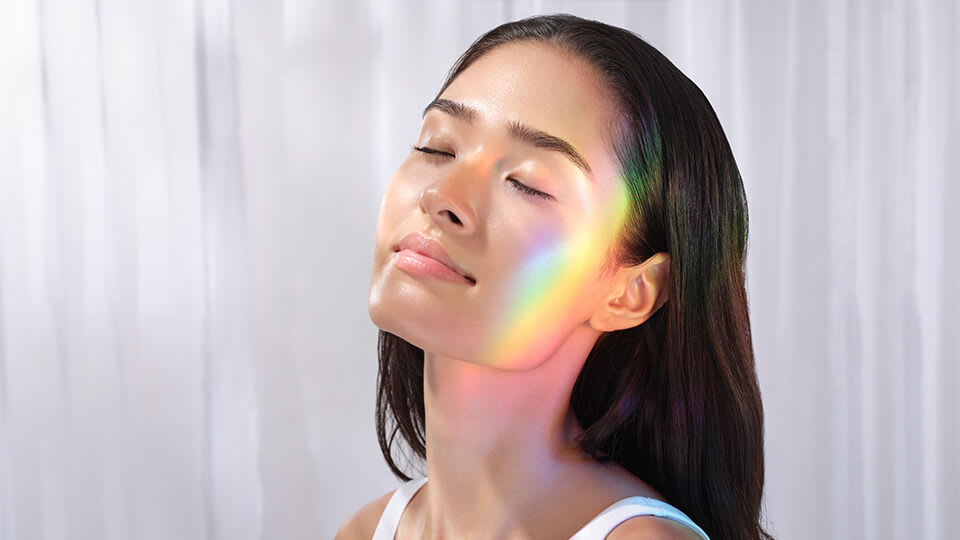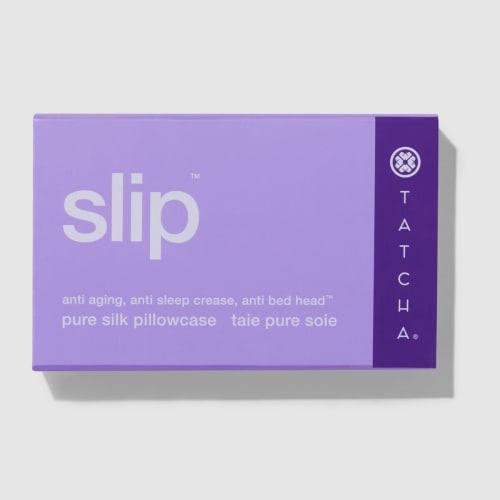You may not think so, but your choice of bedding does have something to do with your beauty routine. Learn how good choices in bed can lead to happier, healthier skin and hair.

What’s the Best Pillowcase for My Hair and Skin?
There are billions of people living on Earth, and billions of different ways they fall asleep at night. But most pre-bedtime routines hew to a similar pattern: We read a book, we plug in our necessary devices, we power down our lights, and we drift off into dreamland. When we do, our bodies, like our phones or computers nearby, recharge for the coming day. According to the Sleep Foundation, our bodies enter a period of intense recovery as our minds traverse the peaks and valleys of our slumber cycles. You already know this, of course, any time you’ve woken up after a good eight hours.
It’s a change you can see in the mirror, because not only is sleep crucial to maintaining inner health, but it also helps us look better, too. “Think of sleep as food and water for your skin,” a dermatologist told Elle magazine. Disrupt your sleep rhythms, and “you’re more susceptible to environmental damage.” In other words, regular sleep helps shore up your skin cells against pollutants that may harm them, and lack of sleep puts you at greater risk for inflammation-related skin concerns like acne.
So will you wake up with a zit for every hour of sleep lost? Not exactly. But there is truth to the term “beauty sleep.” And with some strategic planning, and even some strategic shopping, you can get the most out of your nightly recovery.
Sleep for Hair and Skin
The key to understanding how sleep helps skin is understanding how sleep functions. When we fall asleep overnight—as opposed to napping midday, or dozing off on a plane—our bodies experience REM, or rapid eye movement. During REM, our heartbeats quicken, and we sometimes dream — a person may cycle between REM stages four to five times a night. But it’s the time not spent in REM that is crucial for skin health.
Within these other stages, which include light sleep and deep sleep, our body releases important regenerative agents, like cytokines, that help quiet inflammation and repair inflammatory damage, according to NBC News. (If you’re prone to facial redness but find yourself waking up every morning with clear skin, this might be why.) Growth hormones are also released that are crucial for encouraging cell reproduction in the skin. A recent story in Women’s Health suggests that the first third of our nightly eight-or-so hours is the most important for this function of sleep.
It should be no surprise that these cellular benefits extend to hair as well. Just like skin, hair follicles are regenerated at night as the sleeping body sends its recovery into overdrive. A lack of sleep can—and undoubtedly will—lead to increased bodily stress, which can manifest as hair thinning or hair loss. Sticking to a regular sleeping schedule is one proven way to help manage stress.
How to Get Good Beauty Sleep
Managing your “sleep hygiene,” or forming good and consistent sleep habits, can help you get the most out of your overnight recovery. There are a few steps you can take to ensure better sleep hygiene.
Lights out. And we mean all of them. Since the dawn of human civilization, our days have begun in the morning, because light helps wake our brains and get us moving—two things that we don’t want when we’re trying to wind down. The CDC’s official recommendation is to sleep in a dark room, which is rather intuitive advice; they also recommend banishing electronics, like laptops or smartphones, from the bedroom entirely. The light emitted from these devices can make our brains think it’s still daylight, and keep us running well into sleeping hours.
Eat well before bedtime. It may seem like there’s nothing more restorative than a good midnight snack, but the truth is trickier. Eat too late and go to bed full, and your body’s digestive system might keep you up; eat too early and go to bed hungry, and your sleep might suffer. The Cleveland Clinic recommends ending your last meal about three hours before bedtime. If you’re in need of a snack, they recommend something light but protein-heavy—such as a bowl of Greek yogurt, or apple slices and a scoop of peanut butter.
Consistency is key. This might be the best sleeping advice of all. Just like any other routine you keep, it’s important to stick to more or less the same schedule, according to Harvard Health Publishing. If you’re having difficulty sleeping, try sticking to the same 30-minute bedtime and wake-up windows for a week, and see how much better you sleep.
Soft pillowcases and sheets. It’s not exactly scientific, but a bit of practical good thinking: If you like the bedding you sleep on, you’re more likely to want to go to sleep. Investing in soft, comfortable sheets might help you hit the hay sooner—and stay there longer. Also, some pillowcases can be more beneficial for your hair and skin than others, which is something to keep in mind if you’re hoping to upgrade your beauty routine and your sleep routine in a single trip to the store.
Which pillowcases are the best for hair and skin?
The softer a pillowcase, the better it is for you. Of course, most pillowcases could be described as soft. But different fabrics can actually have an impact on the quality of your hair and skin.
Some fabrics, like cotton, absorb moisture, but softer textiles, like silk or even satin, will help your skin and hair stay moisturized all night. (Because of this, soft pillowcases may help your overnight treatments work even better.) Women with Afro-textured hair often wear silk wraps or bonnets to sleep because the fabric helps hair retain hydration. More abrasive fabrics, even if they’re soft to the touch, can cause breakage.
Silk or satin may also make some of the best pillowcases for wrinkles. Tougher fabrics may tug on skin as you toss and turn in the night. But when you sleep on silk, skin simply glides. If you’re a fitful sleeper, you may want to consider a silk pillowcase, like Tatcha x Slip’s Pure Silk Pillowcase. And you can rest easier knowing that your skin and hair are protected all night long.


